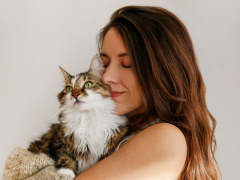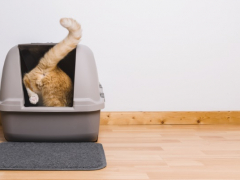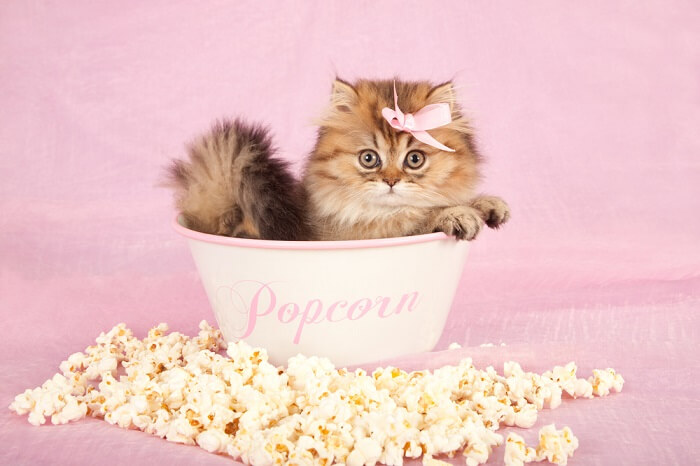
If you’re relaxing in your home movie theater with a bowl of popcorn, chances are you’re going to drop a piece. But what happens if your cat eats the popcorn?
Is popcorn safe for cats to eat? The good news is that popcorn is not toxic to cats, but there are some things you should be aware of before feeding popcorn to your cat on purpose.
While popcorn is not toxic to cats, it is not recommended as it can be a choking hazard, and the added butter and salt can be harmful to their health.Quick Overview: Can Cats Eat Popcorn?





Summary of Content
Can Cats Have Popcorn?
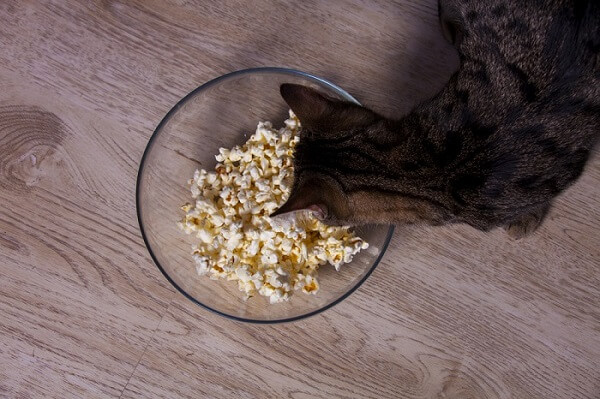
Popcorn is mainly composed of carbohydrates and fats, with a small amount of protein. This makes it an excellent snack for humans, but less good for cats. Cats need a high protein, high fat diet and have no need for carbohydrates.
Whilst popcorn does contain some minerals and B vitamins, these are not in high enough amounts for your cat to get a nutritional benefit from them. There are no known health benefits to eating popcorn.
Is Popcorn Good for Cats? Or Is Bad?
If your cat has just snatched a piece of popcorn, or is currently batting it around on the floor, don’t worry – popcorn is not on the ASPCA’s list of toxic foods.
But that doesn’t mean that popcorn should be given to cats as a snack – it’s not that healthy and has some additional problems that cat parents should be on the lookout for.
Popcorn Is High In Carbs
Popcorn is mainly composed of carbs and fat, with a tiny amount of protein. Whilst this may be a natural combination for the human digestive system, cats have evolved on meat-based diets. Although cats are obligate carnivores, they can digest carbs as part of a balanced diet. However, too many carbohydrates can upset their digestive system and lead to weight gain, insulin resistance, and diabetes.
Popcorn Is a Choking Hazard
Popcorn is light and airy, meaning it’s easy to breathe in. The popcorn pieces are the perfect size to get wedged in the throat or lungs, causing choking. In fact, popcorn shouldn’t be fed to children under 4 due to the hazard – and animals are also at risk.
If your cat has snuck a piece of popcorn and appears to be choking or in distress, you should phone your vet for emergency instructions.
Whilst most cats that eat popcorn won’t choke, it’s a definite risk and one I wouldn’t be happy taking, especially as popcorn is not healthy for your furry friend and contains no nutritional value for them.
Popcorn Toppings
One thing we’ve only touched on so far is the different toppings that popcorn can come with. Many of these toppings make popcorn less healthy and some may even be toxic.
Butter Popcorn
Homemade butter popcorn is likely to contain just butter, and maybe a little oil. Whilst it’s high in fat, these ingredients are not toxic to cats. Again, they shouldn’t be given regularly, and there’s a small risk that they’ll cause an upset stomach, but you don’t need to rush your cat to the vet if they ate homemade butter popcorn.
However, butter-flavored microwave popcorn and pre-popped butter popcorn are a different matter. This can use artificial butter flavoring called diacetyl, which has been shown to cause lung disease often called ‘popcorn lung’ in humans and rats.
Salted Popcorn
The high levels of sodium chloride in salted popcorn can cause excess thirst and increased urination as well as contribute to a high blood pressure. Enough salt can even cause sodium poisoning in cats.
Caramel Popcorn
Caramel popcorn is extremely high in sugar. It may also contain spices such as nutmeg or cinnamon, which can be toxic for cats.
Chocolate-Covered Popcorn
It goes without saying that eating popcorn covered in chocolate is bad for cats, so they definitely shouldn’t be allowed any chocolate popcorn.
How Much Popcorn Can a Cat Eat?
Your feline friend is unlikely to suffer any ill effects from eating a single kernel of popped corn accidentally, as long as they aren’t unlucky enough to choke. Even a couple of pieces of popcorn will likely be fine.
However, popcorn is not good for cats. It contains no valuable nutrition for them, and is mostly made from carbohydrates, which cats do not need in their diet. Cats that eat popcorn regularly will also be more likely to become obese and get diabetes. It’s not a good idea to intentionally feed cats popcorn, but if they grab a bit whilst you aren’t looking, they’ll probably be fine.
If your cat eats a large amount of popcorn, it’s likely they’ll get digestive problems. This will usually pass quickly but contact your vet if they become lethargic or cannot keep down water.
Final Thoughts
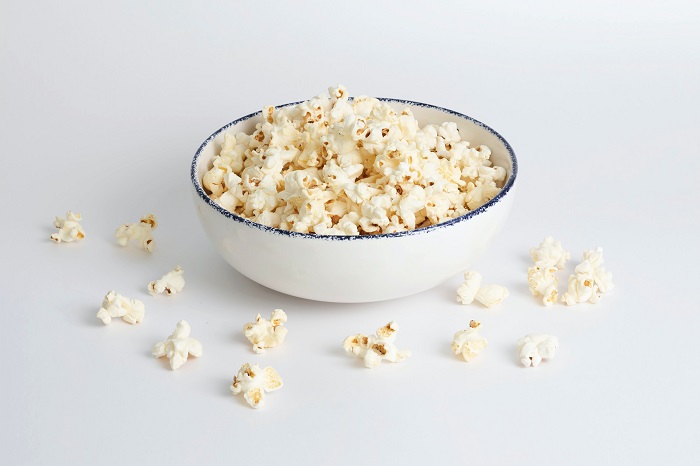
Popcorn is not toxic or poisonous for cats, but it’s not good for them either. It’s best to avoid giving your cat popcorn intentionally, but if they eat a piece or two that has dropped on the floor they’re unlikely to have too many problems.
Double-check the packaging to ensure the popcorn contains no additives or flavorings toxic to cats, and watch out for diarrhea if they have eaten too much.
Frequently Asked Questions
Is popcorn safe for cats?
Plain popcorn is not toxic to cats. However, it is a choking hazard. It also contains no nutritional value to cats, so isn’t a good choice of healthy snack and shouldn't be part of your cat's diet.
Can cats eat raw popcorn?
It’s not a good idea to feed raw popcorn to cats. However, it likely won’t do any harm and the popcorn should move through the digestive system unchanged. The tough seed coat on the corn kernel is very difficult to digest, meaning raw popcorn kernels will likely pass into the litter tray without problem.
Can cats eat buttered popcorn?
One or two pieces of buttered popcorn as a one-off is unlikely to cause a problem. However, buttered popcorn is not a good human food for cats because it contains hardly any protein and lots of carbohydrate and fat. If the popcorn came pre-buttered, there’s also the risk of side effects from the diacetyl, which can cause lung problems if inhaled.
Is Corn harmful to cats?
Corn is not known to be harmful to cats, and cats can safely eat most types of corn. Cats should be fed a complete cat food, which may include corn. Corn is not a 'filler' in cat food, it provides nutrition, but they shouldn't have too much of it.




